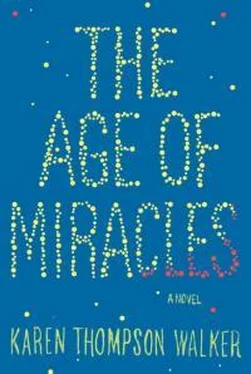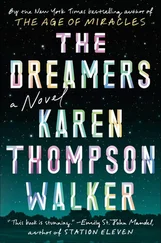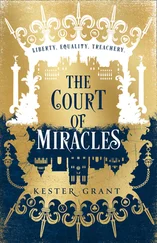I was grateful to that woman during those first few seconds, but then I wanted her to get away from us, and not crouch next to me the way she did while Seth rolled on the sidewalk, his head jerking, my young arms unable to hold his body still, my mind even more useless, those minutes too intimate for a stranger to see.
The seizure finally subsided, but Seth spent that night in the hospital. When he came home the next day, he called me to tell me what I had already guessed:
“They think it’s the syndrome,” he said.
I could feel the words pressing down on my chest.
“I know,” I said.
We didn’t say anything for a little while. I could hear him breathing into the phone.
“But I’m not that worried about it,” he said. I didn’t believe him. “I mean, doesn’t your mom feel okay a lot of the time?”
“Kind of,” I said.
I didn’t tell Seth then that his case already seemed much worse than my mother’s.
He weakened rapidly after that. Soon he was spending most of his time in bed. After school, I’d rush over to his house, and we’d watch movies together or play cards, or just look at the stars through the windows of his room.
“When I get better,” he’d say, “let’s build a fort in the yard and set up your telescope out there.”
“Okay,” I’d say, nodding hard.
But it scared me how thin and wan his face began to look. Sometimes he’d close his eyes for a few seconds, riding out a sudden pain in his head. His nose would bleed and bleed. He talked less and less. His skateboard sat silent in the corner of his room.
Soon, he could barely walk. I felt him drifting away, like ice on a sea.
Seth’s father never did develop the corn he was working on, the one that could live without any light. He gave up and closed his lab. One day that fall, he decided that he and Seth would move away—to Mexico where the radiation was said to be weaker.
I still remember the afternoon Seth told me they were leaving, the way I hung, desperate, on the words he said afterward: “But I bet we’ll come back.”
I remember the day they packed the van, his father carrying Seth in his arms, the way Seth’s legs dangled, spindly, where once they’d been strong. I’d helped Seth pack his things, and he’d given me his skateboard; he couldn’t ride it anymore.
“Keep it for me,” said Seth from the passenger seat. I spent those last minutes crying so hard I couldn’t talk. I remember Seth’s father averting his eyes as he packed the van. “It’s just for a few months,” said Seth, touching my face with his hand. His skin had lost its color, but his dark eyes were as dark as ever. “You’ll see: We’ll come back.”
I remember watching the van roll away from me, Seth’s face receding in the distance. I stood in the dark street for a long time after that, clutching the skateboard to my chest and waiting, as if there existed some slim possibility that the van might change directions and begin to move backward in time instead of forward, while all around me life continued to proceed in only the one direction.
Seth sent me a short email the next day, a few precious words: Mexico is weird , he said, and hot! I miss you!
I read it over many times that day and the next. I could hear the echo of his voice in the words.
It was two days later that the whole of North America went dark, the largest power failure in history. For seventy-two hours, we lived by candlelight and rationed our supplies. All across the continent, crops were left without the nurture of artificial lights. We worried we would run out of food. Looters roamed the cities and the malls. For the first time in my memory, my father stayed home from work. The three of us huddled together in our radiation shelter. My father locked the doors with a chain. My mother worried we didn’t have enough water, so we sipped it as slowly as we could. We counted hours, then days. In the middle of the second night, we heard distant gunshots in the darkness. We didn’t sleep at all.
Finally, on the third day, the lights flicked on again.
But not everything returned. The massive servers that powered our computer networks and our email systems and most of our major websites were temporarily shut down to conserve electricity. All nonessential uses of power were put on hold.
And, as we well know, those servers never went back up.
I wasn’t the only one who lost touch with someone they loved. I still remember the flyers that appeared in post offices and grocery stores; names and photos of people soon hung from the same signposts that had previously carried the news of lost pets. If you see this woman, please tell her Daniel is looking for her. If you’re out there, J.T., here’s my number . It was the newest relationships that were the least likely to survive—millions of new connections were cut off in midbloom. Think of all those potential loved ones lost once again on a planet of strangers. I didn’t have Seth’s phone number, but he’d given me a mailing address in Baja.
I started sending letters. I wrote one every day—every day for weeks.
Maybe it wasn’t the right address. Maybe there was something wrong with the mail.
Sometimes the saddest stories take the fewest words: I never heard from Seth Moreno again.
It still amazes me how little we really knew.
We had rockets and satellites and nanotechnology. We had robot arms and robot hands, robots for roving the surface of Mars. Our unmanned planes, controlled remotely, could hear human voices from three miles away. We could manufacture skin, clone sheep. We could make a dead man’s heart pump blood through the body of a stranger. We were making great strides in the realms of love and sadness—we had drugs to spur desire, drugs for melting pain. We performed all sorts of miracles: We could make the blind see and the deaf hear, and doctors daily conjured babies from the wombs of infertile women. At the time of the slowing, stem cell researchers were on the verge of healing paralysis—surely the lame soon would have walked.
And yet, the unknown still outweighed the known. We never determined the cause of the slowing. The source of our suffering remained forever mysterious.
* * *
I was twenty-three when plans for the Explorer were announced. A new kind of rocket, designed for high-speed travel, the Explorer would carry no humans with its cargo. This was a message in a bottle, a souvenir of Earth, perhaps our last communiqué. It would bring on its journey a gold disc containing information about our planet and its people, in case, in some distant realm of the universe, the ship crossed paths with intelligent life.
A special team was assembled to decide what to include on the disc. Among the final contents were the sounds of waves crashing on a beach, human voices speaking greetings from around the world, images of extinct flora and fauna, a diagram of the Earth’s exact location in the universe. Certain basic facts were engraved in symbols on the outside of the disc, the goal to record in hieroglyphs the whole history of the twenty-first century, to convey in the fewest possible strokes the story of our time.
Not mentioned on the disc was the smell of cut grass in high summer, the taste of oranges on our lips, the way sand felt beneath our bare feet, or our definitions of love and friendship, our worries and our dreams, our mercies and our kindnesses and our lies.
The Explorer would eventually travel distances so great that only time could measure them. A patch of uranium in the middle of the disc would function as a radioactive clock so that one day—maybe 60,000 years from now, when the Explorer first floats near the nearest other star—some other beings might be able to determine the age of the ship.
Читать дальше












